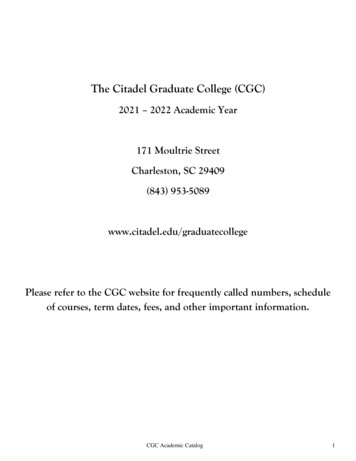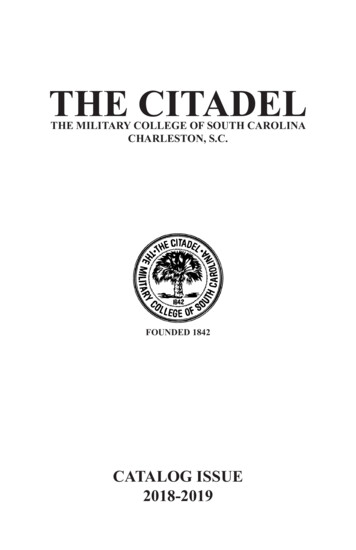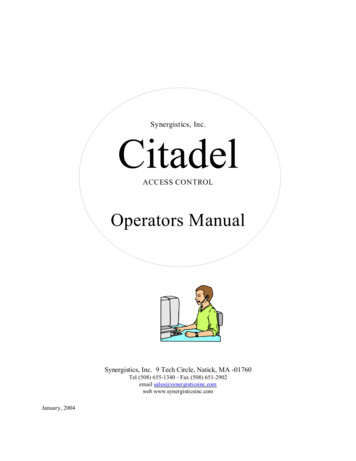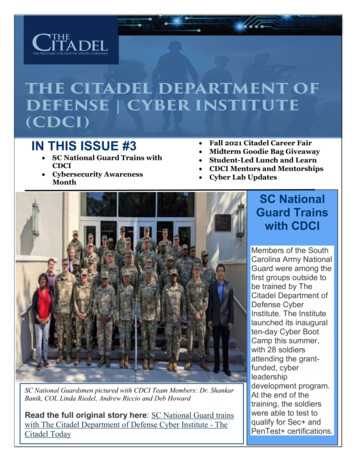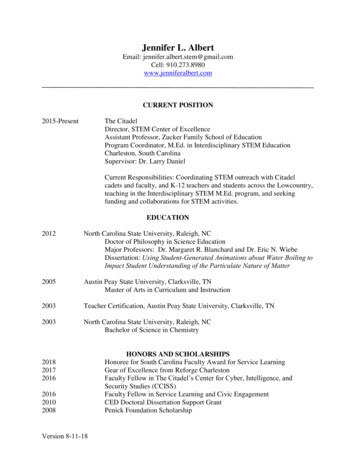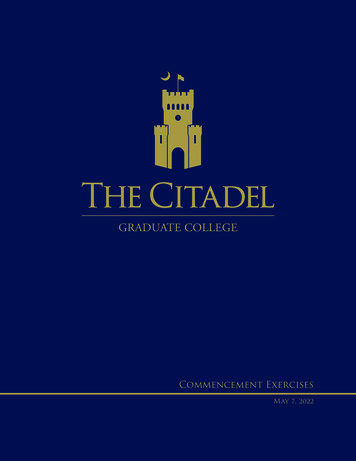
Transcription
The Guidon2011 - 2012The South CarolinaCorps of Cadets1
TABLE OF CONTENTSI.Welcome and Vision, Core Values,and Mission.3II.Organization.17III.History of The Citadel andCitadel Alumni.21IV.The Cadet System.46The Fourth Class System.47Hazing.68Sexual Harassment.79V.Customs and Traditions.82VI.Campus Buildings. 109VII.Academic Departments. 134VIII.Cadet Support Services. 140IX.Athletics. 151X.Committees, Activities& Organizations.164XI.Honors & Awards.192XII.Off-Campus Attractions.215XIII.INDEX.2232Members of the incomingfourth class:We do not pretend to familiarize you completelywith The Citadel in this short book. We present the factsthat you will learn through your training and alwaysremember with pride. We explain the regulations, theschedules and programs; and we list the facts and dates ofimportant Citadel history. Yet to understand The Citadeland the “Whole Person” truly, you must completelyimmerse yourself in the “Leadership Laboratory” andwholeheartedly embrace the fourth class system.Throughout this book you will find helpfulinformation that you will consult throughout yourcadet career, but especially during your freshmen year.Although the journey ahead is long and difficult, if youso choose, your first year at The Citadel can be a yearof great personal growth. If you make it down the “roadless traveled,” you will find yourself in the company ofCitadel graduates who have excelled in the military andindustry at a level out of all proportion to the enrollmentof the school.Your four years will be filled with militarydiscipline which will teach you honor, perseverance,loyalty, and devotion to God and country. The lessonsyou learn you will take with you throughout life.Congratulations on accepting the challenge. May theGuidon prove useful in your cadet career.Cadet Captain Kyle HardesterRegimental Activities Officer3
MESSAGE FROM THE PRESIDENTAs members of the Class of 2015, you are enteringThe Citadel at a time when the need for principledleaders is greater than it has ever been. You are to becommended for accepting the academic, physical andmental challenges that await you. Those challengeswill foster personal growth that develops you in mind,body and spirit.Your time as a cadet will be more demanding andmore rewarding than you ever thought possible. Soonafter you arrive, you will realize that your relationshipswith classmates are central to your success, as they willbe the ones to support and encourage you.4A commitment to personal integrity is required ofeach cadet, and as you practice self-respect and respectfor others, you will gain the confidence that comes witha honorable lifestyle. You will learn the value of takingresponsibility for your actions, and you will experiencethe rewards that follow honorable behavior. Once youhave completed your education, you will leave TheCitadel armed with the knowledge and values necessaryfor effective principled leadership.The Citadel’s reputation for producing principledleaders spans 168 years. I challenge you to join TheCitadel’s tradition of excellence in honor, leadership,service, and academics. Together we will build upon TheCitadel’s solid foundation as we ensure the institutionremains a relevant force in the 21st century.John W. RosaLieutenant General, USAF,( Retired)PresidentCitadel Class of 19735
MESSAGE FROM THE PROVOST ANDDEAN OF THE COLLEGEOn behalf of our faculty, I wantto welcome you to The Citadel. Youhave made a life changing decision.The Citadel experience is unique.It affords you an exceptionalopportunity to develop yourpotential academically, physically,and as a principled leader. Thefocus is on the whole person in alearning environment that emphasizes responsibility,honor, and integrity.Relatively few choose this “road less traveled”because it is a demanding one. But those who make thischoice find a new level of opportunity, self-confidence,and fulfillment that far exceeds their expectations.The Citadel experience is a team effort. The faculty,your advisor, and all of us in Academic Affairs are apart of that team. We want you to succeed, and we standready to assist you. The faculty-student relationship is aspecial one. As faculty members, we endeavor to createin our students a level of excitement about the academicdisciplines that rivals the love we have for our ownchosen field of study. Our faculty are dedicated to theteaching-learning process, and our greatest reward is tosee highly-motivated students develop to their potential.6We view learning as a journey not a destination.You and your family have already made a significantcommitment to that journey. Now we join you for thesenext four years on that journey which we hope willbe very rewarding and will prepare you for a lifetimeof learning.Our goal is not just to teach facts. Our goal onthis part of the journey is to assist you in enhancingyour abilities to think, to analyze, to communicate, tovalue, and to be tolerant of diverse philosophies. Youplay a major role in how well we succeed at this goal.The more prepared you are on a daily basis, the morerewarding will be the journey for all of us. I urge youto remain focused and to make a significant investmentin your future during these next four years. Such aninvestment has made the difference for thousands ofgraduates from the Citadel who “wear the ring.”I look forward to being a part of your journeywhile you are here. And, I look forward to celebratingyour success as a graduate of The Citadel.Samuel M. Hines, Jr.Brigadier General, UMSCProvost and Dean of the College7
MESSAGE FROM THECOMMANDANTCongratulations on yourdecision to attend The Citadel as amember of the Class of 2015. Youmade the choice to become a proudmember of the South Carolina Corpsof Cadets and attend an institutionthat has a long and illustrious historyof developing principled leadersfor our state and nation. The nextfour years will be a challenge but if you are committed,disciplined, and readily apply yourself to the best of yourability, you will succeed. The experience of your knob yearwill be the foundation of four years that will serve you notonly as a cadet but long after graduation.The life of a cadet is not easy – nor is it intendedto be. You will be challenged academically, militarily,emotionally, and physically. The staff, faculty, and cadetleaders are committed to lead, teach, mentor and guide youin your endeavors but it is ultimately your responsibilityto achieve excellence in the classroom, adhere to theregulations that govern cadet conduct, and demonstrate theattributes and qualities that personify a Citadel cadet. It isexpected and required of you. The key to success as a cadetis twofold – achieve or exceed the standards and follow therules. I have every confidence that you have the ability toachieve balanced excellence in the four pillars that define8The Citadel experience – academic achievement, militarydiscipline, physical fitness, and a strong moral character.The Citadel experience is a sequential process thatdevelops principled leader through academic programs andapplication among your peers. As a knob, the foundationwill be established through the Fourth Class System. As aThird Class cadet, you will apply the positive leadershipqualities and traits you observed from your cadet leaders.As a junior, you will have the opportunity to furtherdevelop your leadership skills by leading your peers andunderclassmen. As a senior, the ultimate test awaits you –to lead the Corps of Cadets.In four short years, you will have earned the privilegeof wearing “the ring” – the visible symbol that you area Citadel alumnus imbued with the core values of ourinstitution. These values and strength of character willidentify you as a graduate of The Citadel and personifythe traits of principled leadership in the service of yourcommunity, state, and nation.I commend you for making this choice – to take thepath that many consider but few undertake. You made theright choice. I look forward to serving The Citadel withyou and for you.L. A. MercadoColonel, U.S. Marine Corps (Retired)Commandant of CadetsCitadel Class of 19799
MESSAGE FROM THE REGIMENTALCOMMANDERMembers of the Class of 2015:Congratulations on your decision to attend aninstitution that provides unique opportunities to developyou as a person. Your journey as a cadet starts withyour “Knob” year. These nine months will be the mostchallenging yet rewarding months of your life. Youwill face obstacles that may appear overwhelming,but through steadfast determination and reliance onyour classmates, you will rise over these obstacles andachieve great things. You will form a bond with yourclassmates like nothing you have ever experienced;they will be your source of inspiration. The Citadelwill prepare you to be a leader of principle. Words likeduty, honor, integrity, and humility will take on a newmeaning to you.10Throughout your time at The Citadel, you willlearn to balance your academic requirements along withyour military duties. Learn from the choices you makeand from those others will make around you. Alwaysdo the right thing, even when no one is looking. I, alongwith the Corps, will hold you to the same standards setbefore us. My officers and NCO’s will guide and mentoryou along the way. I have the upmost confidence in theirability to prepare you to be a successful member of theSouth Carolina Corps of Cadets.I leave you with these finals words: Alwaysremember why you chose The Citadel. Embrace eachchallenge that comes before you, and NEVER give up.Matthew C. CollierRegimental Commander, S.C.C.CCitadel Class of 201211
The Statement Of VisionMissionAchieving Excellence in theEducation of Principled LeadersThe Citadel’s mission is to educate and prepare graduatesto become principled leaders in all walks of life byinstilling the core values of The Citadel in a challengingintellectual environment.Core ValuesAcademics: We produce graduates who have insightinto the issues, ideas and values that are important tosociety and possess the skills necessary to deal withthem successfully.Duty: We emphasize the importance of individualaccountability and the moral obligation of responsibilityfor the welfare of others.Honor: We adhere to a code which teaches thatuncompromising personal integrity is the primary guidein all situations.Morality: We believe that an individual’s character is ofutmost importance, and therefore, we provide trainingwhich emphasizes ethical principles and core values.Discipline: We operate a leadership laboratory whichemphasizes a structured environment, acceptance ofresponsibility, self-confidence, and service to others.Diversity: We promote diversity in all segments of ourcampus community and in all aspects of college life.12The Citadel strives to produce graduates who have insightinto issues, ideas, and values that are of importance tosociety. It is equally important that Citadel graduatesare capable of both critical and creative thinking, haveeffective communication skills, can apply abstractconcepts to concrete situations, and possess themethodological skills needed to gather and analyzeinformation.Throughout its history, The Citadel’s primary purposehas been to educate undergraduates as members of theSouth Carolina Corps of Cadets and to prepare them forpost-graduate positions of leadership through academicprograms of recognized excellence supported by thebest features of a structured military environment. Thecadet lifestyle provides a disciplined environment thatsupports the growth and development of character,physical fitness, and moral and ethical principles.A complementary purpose of The Citadel, realizedthrough the College of Graduate and ProfessionalStudies, is to provide the citizens of the Lowcountry andthe State of South Carolina opportunities for professionaldevelopment by offering a broad range of educationalprograms of recognized excellence at both the graduate13
and undergraduate levels. These programs are designedto accommodate the needs of non-traditional studentsseeking traditional and demanding academic challenges.Institutional CharacteristicsThe Citadel is a coeducational, comprehensive,state-assisted, four-year institution whose primaryundergraduate student body consists of approximately2,000 members of the Corps of Cadets, all of whom resideon campus. The primary service area for these studentsis regional, with approximately half of each freshmanclass coming from South Carolina. The Citadel, however,does draw undergraduate students from all parts of theUnited States and many foreign countries. The collegeoffers a wide range of baccalaureate degree programs(Bachelor of Arts, Bachelor of Science, Bachelorof Science in Business Administration, Bachelor ofScience in Civil Engineering, and Bachelor of Sciencein Electrical Engineering) in the humanities, social andnatural sciences, business administration, engineering,and education. These academic programs preparegraduates of the Corps of Cadets for a variety of careers.Approximately half of these graduates enter businessprofessions, while a third or more enter into militaryand government service. The remainder directly pursuegraduate and professional studies. Many graduateschoose to pursue professional or graduate degrees laterin their careers.14The Citadel Graduate College serves a degree-seekingpopulation of approximately 2,000 of which the primaryservice area is the South Carolina Lowcountry. TheCollege of Graduate and Professional Studies offers threebaccalaureate degree programs: Bachelor of Science inBusiness Administration, Bachelor of Science in CivilEngineering, and Bachelor of Science in ElectricalEngineering. Seven graduate degree programs areoffered as well: Master of Arts, Master of Science, Masterof Arts in Education, Master of Arts in Teaching, Masterof Education, Master of Business Administration, andSpecialist in Education.Meeting the needs of the South Carolina Lowcountryin terms of instruction, public service, and research,including such initiatives as cooperative programswith other educational institutions, is an important partof The Citadel’s mission. In its educational programs,The Citadel acknowledges and endorses the teacherscholar ideal, recognizing that the excellence of all ofits academic programs is dependent upon the qualityof its faculty. This ideal is pursued through teaching,lecturing, researching, writing, publishing, and publicservice. The faculty also shares their scholarly pursuitsand endeavours with audiences beyond the college.15
“I shall be telling thiswith a sighSomewhere agesand ages hence:Two roads divergedin a wood, and I—I took the oneless traveled by,And that has madeall the difference.”Robert FrostII. ORGANIZATIONBoard Of VisitorsColonel Douglas A. Snyder, ’82ChairColonel Glenn D. Addison, USAFR (Retired), ’79Vice ChairColonel Allison Dean Love, CGC ’93Colonel W. Thomas McQueeney, ’74Colonel Fred L. Price, Jr., ’75Lieutenant Colonel Ben W. Legare, Jr., USA (Retired),’63Colonel James M. McQuilla, ’88Lieutenant General W. Michael Steele, USA (Retired), ’67Colonel Dylan W. Goff, ’02Lieutenant General John B. Sams, Jr., USAF (Retired), ’67Colonel Tecumseh Hooper, Jr., ’69Secretary to the Board of VisitorsColonel Myron C. Harrington, Jr., USMC (Retired), ’60Ex Officio MembersThe Honorable Nikki R. HaleyGovernor of South CarolinaMajor General Robert E. Livingston, Jr.Adjutant General of South CarolinaThe Honorable Mick ZaisState Superintendent of EducationEmeritus MemberColonel Leonard C. Fulghum, Jr. ’511617
Senior Administrative StaffSenior Activity DirectorsLt Gen John W. Rosa, USAF, Ret., ’73.PresidentBG Samuel M. Hines, Jr., UMSC.Provost andDean of the CollegeBG Thomas Elzey , UMSC. Executive Vice Presidentfor Finance, Administration, and OperationsCol Leo A. Mercado, USMC, Ret., ’79.Commandant of CadetsCOL G. Dewey Yeatts, UMSC. Vice President forFacilities and EngineeringCOL L. Jeffery Perez, USK. Vice President forExternal AffairsMr. Larry W. Leckonby.Director of IntercollegiateAthleticsCOL Mark A. Bebensee, UMSC.AssociateProvostDr. Steve A. Nida. Associate Dean of The CitadelGraduate CollegeCOL Joseph W. Trez, USA, Ret., ’69.Director of StaffCOL Cardon B. Crawford, USA, Ret., ’83.Director of Governmental and Community AffairsMajGen R. Cliff Poole, USAR, Ret, ’57.Director of the Krause Center for Ethicsand LeadershipMr. Mark C. Brandenburg, ’90.General CounselCol Thomas G. Philipkosky, USAF, Ret., ’82.Executive Assistant to the PresidentLTC Pamela S. Barton, USAR, Ret.Assistant Commandant for Operations and TrainingMr. Stephen C. Tobias ’67.Chairman ofThe Citadel FoundationMAJ William A. Fletcher, Jr.Director of PublicSafety and Provost MarshalLTC Suzanne Bufano, UMSC. Director ofCounseling CenterCol Carey M. Capell, USAF, Ret., ’71.Surgeon, Director of InfirmaryCol Dennis D. Carpenter, USAF, Ret.Director of Human ResourcesMr. Charles R. Adams, Jr. Director of AuxiliaryEnterprisesLTC Kevin C. Dopf, USA, Ret. AssistantCommandant for Personnel and LogisticsMs. Susan B. Reynolds. Director ofFinancial ServicesLTC Henry M. Fuller, Jr., UMSC (CGC) ’02.Director of Financial AidCol Christopher L. Moore, USAF, Ret.,’81.Assistant Commandant for DisciplineLTC Joel C. Harris, USA, Ret.Chaplain tothe CorpsMr. James R. Baldwin.President of The CitadelBrigadier FoundationCol Ralph F. Tice, USMC, Ret. ’74.President ofThe Citadel Alumni Association1819
LtCol Robert A. Sberna, USAF, Ret., ’76.Director of Cadet ActivitiesCDR J. Mike Alverson, USN (Ret).Director of MusicCPT S. Jim Dillahey, UMSC, ’01.Pipe Band DirectorCol Angie Le Clercq, UMSC. Director of LibraryServicesMr. Richard Nelson. Director of InformationTechnology ServicesCol James N. Openshaw, USAF, Ret., ’73.Budget DirectorLtCol John W. Powell, Jr., USMCR, ’77.Director of AdmissionsMr. Michael F. Rogers, ’70.Director of AlumniAffairs/Career ServicesMs. Jessica M. Tuckman.Director of ExecutiveEventsMr. F. Ward Logan (CGC) ’02. TreasurerAuxiliary Activities ManagersMr. Ward Scheindlinger.Dining ServicesMr. Christopher P. Floyd.Laundry and Dry CleaningMr. Rick Gutierrez.Tailor ShopMr. Andy Beckwith .BookstoreMr. Kenneth A. Woodruff.Cadet StoreMs. Nancy Bright.Communications and OneCard20III. THE HISTORY OF THE CITADELOrigins Of The Citadel1783-1842The name Citadel evokes images of military mightand strength. Before its use as the Citadel Academybeginning in 1842, the site of the institution had beenused for military purposes by both the state and federalgovernments dating back to colonial times.As the economy of South Carolina diversifiedto include the cultivation of crops other than rice, abuilding was needed for the “inspection of tobacco.”It was on this site in downtown Charleston, that such abuilding was built in 1790. On February 22, 1797, thetwo regiments of the city were reviewed by PresidentGeorge Washington near the “Tobacco Inspection” onwhat was later known as the Citadel Green, now knownas Marion Square.In December, 1822, the legislature passed “An Actto Establish a Competent Force as a Municipal Guard forthe Protection of the City of Charleston and Vicinity.”Marion Square was selected for an arsenal and guardhouse and in 1829, the building which was to be known asThe Citadel was completed. The state and city authoritiesrequested that it be garrisoned by United States troopsfrom Fort Moultrie. The Nullification Crises of 1832and the growing schism between the North and Southcaused the state to request the withdrawal of UnitedStates troops in 1832, and the facility was garrisonedby South Carolina troops for the next ten years.21
The South Carolina Military AcademyThe Early YearsState troops occupied both The Citadel and TheArsenal at a cost of 24,000 per year. Governor JohnP. Richardson believed that guard duties should becombined with a system of education to be offeredto the poor but deserving boys of South Carolina. OnDecember 20, 1842, the South Carolina Legislaturepassed an act establishing The South Carolina MilitaryAcademy. The Citadel and The Arsenal were convertedinto educational institutions and students replaced thestate troops.General James Jones, the first Chairman of theBoard of Visitors, was responsible for establishingthe regulations for military instruction and discipline.He used the regulations of The United States MilitaryAcademy at West Point. For the curriculum, GeneralJones followed the course designed by Captain AldenPartridge, the founder of Norwich University in Vermont.The arts and sciences were combined with a militaryeducation designed to provide the graduate with “Acomplete and generous education which fits a man toperform justly, skillfully, and magnanimously all theoffices of a citizen, both private and public, of peaceand war.”On March 20, 1843, twenty cadets reported to TheCitadel Academy and fourteen to the Arsenal Academy.The State paid the tuition for the “beneficiary” cadetswho were selected from the then twenty-nine countiesin South Carolina. The tuition for cadets who were ableto pay was 200 per year.Initially, The Citadel Academy and The ArsenalAcademy operated independently; however, in 1845the role of The Arsenal Academy was changed to theinstruction of freshmen. As a result, cadets spent theirfirst year in Columbia and then transferred to TheCitadel for the remaining three years. This allowedthe administration to economize by eliminating theduplication of course work.The academic year began on New Year’s Day2223
and ended in late November. Military sessions wereheld after exams in April and in December. Daily lifewas regimented and there were no vacations. Therewas an infantry or artillery drill held each weekdayfrom March 1 to December 1. Classes were not held onSaturdays or Sundays, however there was a room andcorps inspection on Saturdays and church attendance wasrequired on Sundays. The cadet literary societies, TheCalliopean and The Polytechnique, provided a popularform of entertainment. The cadets tested their oratoricalabilities in lively debates on a variety of subjects. Thefirst graduating class was in 1846. Charles CourtneyTew was the first honor graduate.There were yellow fever epidemics in Charlestonduring the summers of 1843, 1849, 1852, 1854 and1856. The Citadel’s routine was disrupted and the corpsof cadets either disbanded or relocated to The Arsenalin Columbia.In 1846, South Carolina was preparing to furnishits volunteers to fight in the Mexican War. The recruitsfor the Palmetto Regiment were sent to The Citadel toreceive military instruction and the cadets served astheir drillmasters. The Palmetto Regiment distinguisheditself in battle and their flag was the first in MexicoCity in 1847.The Citadel had gained the reputation for strictmilitary discipline and high academic standards.2425The Civil War PeriodWhen South Carolina seceded from the Unionin December 1860, Major Robert Anderson moved hisgarrison of United States troops from Fort Moultrieto Fort Sumter and requested reinforcements from thefederal government. In order to protect the entranceto Charleston Harbor, the Governor of South Carolinaordered a fortification to be constructed on Morris Island.On January 9, 1861, Citadel cadets who were stationedon Morris Island fired on the U.S. steamer, The Star ofthe West, which failed to re-supply Fort Sumter.The New York Evening Post reported, “Themilitary men on board The Star of the West] highlycomplimented the South Carolinians on their shootingin this first attempt. They say it was well done; that allthat was needed was a little better range, which theyprobably could have obtained in a few minutes. Theirline was perfect; and the opinion is expressed that someone had charge of the guns who knew his business.”On January 28, 1861, the Corps of Cadets weremade part of the military organization of the state andwere known as The Battalion of State Cadets. The cadetstook part in eight engagements in defense of Charlestonand South Carolina. The firing on the Star of the West
and the engagement at Williamston were consideredthe first and last shots of the war. In recognition of theirhonorable and meritorious service, the Office of theSouth Carolina Adjutant General authorized The Citadelto carry the following battle and campaign streamers:Star of the West, January 9, 1861Wappoo Cut, November 1861James Island, June 1862Charleston and Vicinity, July to October 1863James Island, June 1864Tulifinny, December 1864James Island, December 1864 to February 1865Williamston, May 1865Sumter, First Manassas, Shiloh, Vicksburg, Antietam,Chancellorsville, Gettysburg, Atlanta, and Petersburg.Union Occupation And ReopeningAfter experiencing the excitement of manning theguns on James Island in the spring of 1862, thirty-sixcadets became tired of the college routine and desertedThe Citadel on June 9, 1862, and were subsequentlydismissed by The Board of Visitors. These ex-cadetsjoined the Sixth Regiment of the S.C. Cavalry under Col.Hugh Aiken and were known as the Cadet Company orCadet Rangers. They fought in at least twelve battlesbetween 1863 and 1865 while earning laurels for braveryand professionalism.Of the 224 graduates living at the time of the CivilWar, 209 entered the Confederate service. Four graduatesachieved the rank of Brigadier General: JohnsonHagood, Ellison Capers, Evander Law and MicahJenkins. In addition, there were nineteen colonels, elevenlieutenant colonels, eighteen majors and numerousjunior officers and enlisted men. Citadel graduates wereinvolved in the major battles of the war including: FortIn February 1865, The Arsenal Academy inColumbia was burned by Gen. William T. Sherman’stroops and never reopened. The Officers’ Quartersat the Arsenal, however, were not burned and todaythe building serves as the South Carolina Governor’sMansion. The Citadel Academy ceased operation asa college when the Union troops entered Charlestonand occupied the site.In April 1877, a group of nine graduates met inCharleston to discuss reorganizing the Associationof Graduates, which had been established in 1852.They also considered plans for recovering The Citadelfrom the United States Government and reopeningthe college. A publicity campaign was started toenlist favorable support in South Carolina for thereopening of the military academy. A claim wasmade against the United States Government to returnThe Citadel buildings to the State.In December 1877, Brigadier General JohnsonHagood, an 1847 Citadel graduate, was appointedChair-man of the Board of Visitors. Gen. Hagoodwas elected Governor of South Carolina and servedfrom 1880 to 1882. His position and influence pavedthe way for the reopening of The Citadel.On January 10, 1882, the Judge AdvocateGeneral of the United States Army rendered the2627
opinion that the State of South Carolina was entitledto immediate possession of The Citadel. On January31, 1882, the South Carolina Legislature passed theact to reopen the college.The 1882 session began with an enrollment of185 cadets. Colonel John P. Thomas, who had beenthe superintendent of The Arsenal from 1861 to 1865and an 1851 graduate, was named superintendent ofThe Citadel in 1882. Although there were no longermunitions to guard, Colonel Thomas re-instituted thesame strict military system as well as the intensiveacademic program.Spanish American WarIn the war with Spain in 1898, more Citadelgraduates volunteered for service than were needed.Seventeen Citadel graduates served with the volunteerregiments. Five graduates served in the Regular Army.Name ChangeIn 1910, the college’s name was officially changedfrom The South Carolina Military Academy to TheCitadel, The Military College of South Carolina. Thischange was necessary to reflect the academic natureof the institution. The word “Academy” had cometo indicate a high school instead of a college and itpresented an incorrect perception of The Citadel, whichis an institution of higher education.28National Defense ActThe National Defense Act of June 3, 1916, beganthe formation of Reserve Officers Training Corps inU.S. colleges. The standards established by the WarDepartment were met at The Citadel. After conductingthe War Department’s three-day inspection in 1918, Col.Charles Noyes indicated that “The Citadel is maintainingits position as a distinguished military college.”The National Defense Act also offered theopportunity for recent graduates to enter the RegularArmy. Of the class of 1917, all 33 entered military service.Six entered the Regular Army and thirteen others werecommissioned in the United States Marine Corps. In TheStory of The Citadel, Colonel Bond noted that so manyCitadel graduates h
Relatively few choose this "road less traveled" because it is a demanding one. But those who make this choice find a new level of opportunity, self-confidence, and fulfillment that far exceeds their expectations. The Citadel experience is a team effort. The faculty, your advisor, and all of us in Academic Affairs are a part of that team.


